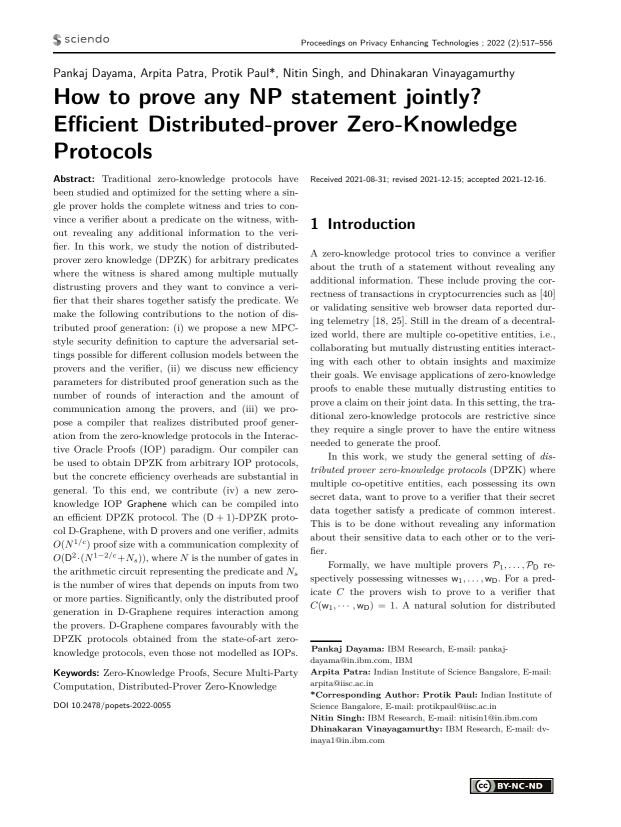How to prove any NP statement jointly? Efficient Distributed-prover Zero-Knowledge Protocols
Authors: Pankaj Dayama (IBM Research), Arpita Patra (Indian Institute of Science Bangalore), Protik Paul (Indian Institute of Science Bangalore), Nitin Singh (IBM Research), Dhinakaran Vinayagamurthy (IBM Research)
Volume: 2022
Issue: 2
Pages: 517–556
DOI: https://doi.org/10.2478/popets-2022-0055
Abstract: Traditional zero-knowledge protocols have been studied and optimized for the setting where a single prover holds the complete witness and tries to convince a verifier about a predicate on the witness, without revealing any additional information to the verifier. In this work, we study the notion of distributedprover zero knowledge (DPZK) for arbitrary predicates where the witness is shared among multiple mutually distrusting provers and they want to convince a verifier that their shares together satisfy the predicate. We make the following contributions to the notion of distributed proof generation: (i) we propose a new MPCstyle security definition to capture the adversarial settings possible for different collusion models between the provers and the verifier, (ii) we discuss new efficiency parameters for distributed proof generation such as the number of rounds of interaction and the amount of communication among the provers, and (iii) we propose a compiler that realizes distributed proof generation from the zero-knowledge protocols in the Interactive Oracle Proofs (IOP) paradigm. Our compiler can be used to obtain DPZK from arbitrary IOP protocols, but the concrete efficiency overheads are substantial in general. To this end, we contribute (iv) a new zeroknowledge IOP Graphene which can be compiled into an efficient DPZK protocol. The (D + 1)-DPZK protocol D-Graphene, with D provers and one verifier, admits O(N 1/c ) proof size with a communication complexity of O(D2 ·(N 1−2/c +Ns )), where N is the number of gates in the arithmetic circuit representing the predicate and Ns is the number of wires that depends on inputs from two or more parties. Significantly, only the distributed proof generation in D-Graphene requires interaction among the provers. D-Graphene compares favourably with the DPZK protocols obtained from the state-of-art zeroknowledge protocols, even those not modelled as IOPs.
Keywords: Zero-Knowledge Proofs, Secure Multi-Party Computation, Distributed-Prover Zero-Knowledge
Copyright in PoPETs articles are held by their authors. This article is published under a Creative Commons Attribution-NonCommercial-NoDerivs 3.0 license.

